

The Justification Debate: Wright & Piper. Since Christianity Today's August 2007 cover story, "What Did Paul Really Mean?
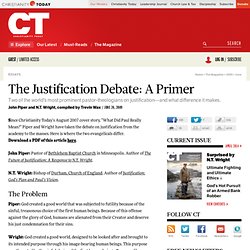
" Piper and Wright have taken the debate on justification from the academy to the masses. Here is where the two evangelicals differ. Download a PDF of this article here. John Piper: Pastor of Bethlehem Baptist Church in Minneapolis. Author of The Future of Justification: A Response to N.T. N.T. The Problem Piper: God created a good world that was subjected to futility because of the sinful, treasonous choice of the first human beings.
Wright: God created a good world, designed to be looked after and brought to its intended purpose through his image-bearing human beings. The Law Piper: God revealed himself through the Law, which pointed to Christ as its end and goal, commanded the obedience that comes from faith, increased transgressions, and shut the mouths of all humans because no one has performed the righteousness of the Law so as not to need a substitute. Bonhoeffer & Barth. Dietrich Bonhoeffer in the Theology of Karl Barth By Matthew Puffer If Bonhoeffer’s importance to Barth’s theology is little noted, this is not without cause.
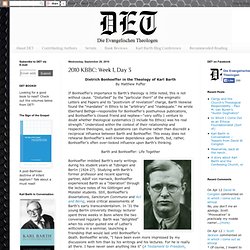
“Disturbed” by the “particular thorn” of the enigmatic Letters and Papers and its “positivism of revelation” charge, Barth likewise found the “mandates” in Ethics to be “arbitrary” and “inadequate.” He wrote Eberhard Bethge—responsible for Bonhoeffer’s posthumous publications, and Bonhoeffer’s closest friend and nephew—“very softly I venture to doubt whether theological systematics (I include his Ethics) was his real strength.”
Understood within the context of their relationship and respective theologies, such quotations can illumine rather than discredit a reciprocal influence between Barth and Bonhoeffer. This essay does not rehearse Bonhoeffer’s well-known dependence upon Barth, but, rather, Bonhoeffer’s often over-looked influence upon Barth’s thinking. Dietrich Bonhoeffer. Dietrich Bonhoeffer (German: [ˈdiːtʁɪç ˈboːnhœfɐ]; 4 February 1906 – 9 April 1945) was a German Lutheran pastor, theologian, anti-Nazi dissident, and key founding member of the Confessing Church.
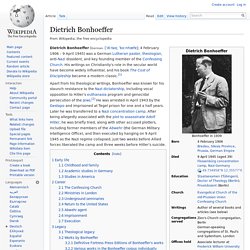
His writings on Christianity's role in the secular world have become widely influential, and his book The Cost of Discipleship became a modern classic.[1] Apart from his theological writings, Bonhoeffer was known for his staunch resistance to the Nazi dictatorship, including vocal opposition to Hitler's euthanasia program and genocidal persecution of the Jews.[2] He was arrested in April 1943 by the Gestapo and imprisoned at Tegel prison for one and a half years.
Later he was transferred to a Nazi concentration camp. Early life[edit] Jürgen Moltmann. Jürgen Moltmann at Aarhus University 29.
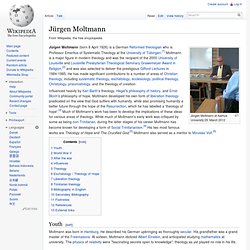
March 2012 Jürgen Moltmann (born 8 April 1926) is a German Reformed theologian who is Professor Emeritus of Systematic Theology at the University of Tübingen.[1] Moltmann is a major figure in modern theology and was the recipient of the 2000 University of Louisville and Louisville Presbyterian Theological Seminary Grawemeyer Award in Religion,[2] and was also selected to deliver the prestigious Gifford Lectures in 1984-1985. He has made significant contributions to a number of areas of Christian theology, including systematic theology, eschatology, ecclesiology, political theology, Christology, pneumatology, and the theology of creation.
Youth[edit] Moltmann was born in Hamburg. World War II[edit] He took his entrance exam to proceed with his education, but went to war instead as an Air Force auxiliary in the German army. Karl Barth. Beginning with his experience as a pastor, Barth rejected his training in the predominant liberal theology typical of 19th-century European Protestantism.[4][5] Instead he embarked on a new theological path initially called dialectical theology, due to its stress on the paradoxical nature of divine truth (e.g., God's relationship to humanity embodies both grace and judgment).[6] Barth's unease with the dominant theology which characterized Europe led him to become a leader in the Confessing Church in Germany, which actively opposed Adolf Hitler and the Nazi regime.[7] In particular, Barth and other members of the movement vigorously attempted to prevent the Nazis from taking over the existing church and establishing a state church controlled by the regime.
This culminated in Barth's authorship of the Barmen Declaration, which fiercely criticized Christians who supported the Nazis.[8] Scientia Et Sapientia. My name is Marc Cortez and I teach theology at Wheaton College in Wheaton, IL.
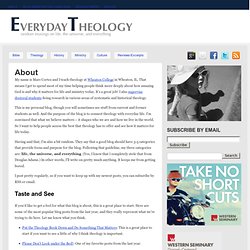
That means I get to spend most of my time helping people think more deeply about how amazing God is and why it matters for life and ministry today. It’s a great job! I also supervise doctoral students doing research in various areas of systematic and historical theology. This is my personal blog, though you will sometimes see stuff from current and former students as well. And the purpose of the blog is to connect theology with everyday life.
Having said that, I’m also a bit random. I post pretty regularly, so if you want to keep up with my newest posts, you can subscribe by RSS or email. Taste and See If you’d like to get a feel for what this blog is about, this is a great place to start.